|
Where No One Counts When will we count the dead in Gaza? Those buried in named graves we know, all the tens of thousands of them, those buried in the rubble, the disappeared with no one left to name them, are still unknown uncounted. Then the other Disappeared, prisoners of war if it were a war, but with only the rights of terrorists who have no rights at all in this unequal conflict that some call ‘war’. And how can we count the injured in Gaza when there are no hospitals left and its people don’t count so no one can count those numbers. and perhaps no one will in a country where people don’t count. Now the starved and starving have joined them, the bags of baby bones the unaccounted numbers of intentional famine in Gaza where still no one counts. First published in New Verse News, April 17, 2024. 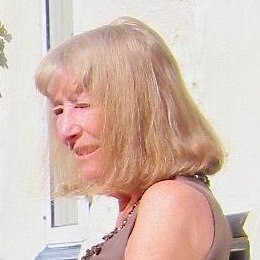 Lynn White lives in north Wales. Her work is influenced by issues of social justice and events, places and people she has known or imagined. She is especially interested in exploring the boundaries of dream, fantasy and reality. www.lynnwhitepoetry.blogspot.com and www.facebook.com/Lynn-White-Poetry
0 Comments
The Flour Massacre The world closed its eyes the day that flour was airdropped Into a broken city. A child’s dusty hands reach out To a loaded gun. His stomach already knows the bite of hunger. When his father died, he could count through the shroud: 24 ribs. 118 bodies Spilt over flour. If he survives, he will remember the taste Of blood every time he breaks bread. The world turned its back the day that they rolled in on trucks With sacks filled with grain. This is the price of aid. 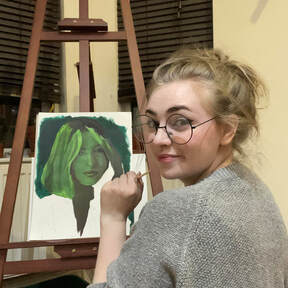 Nicole is an English poet who predominantly explores themes of meaning, atheism and science in her work. She has been published by The Bookends Review, Poetry Undressed, Cats Bite Back, Prospectus and Sunday Mornings at the River. Life and Breath unblessed street bare feet a fleshless shadow on the alleyway wall deprived degraded benumb inward emptiness longing for a bite even just just a crumb would be enough unblessed street bare feet express less skin and bones weakness endure alone straiten pain depleted veins unblessed street bare feet life and breath under born worth cry snuffed close the eyes wanting to feel alive in a time to survive Sheltering an ear whisper beyond means seemly out just for the hurting skin to the bones knowing to the lone dry eyes not much to see lonely cry within a sigh sheltering endless pain in a plentiful world an ear whisper through the alley ghostly ashes in the trash fingernails scraping in the dumpster for a mouse nibbling in the spoiling sheltering endless pain in a plentiful world an ear whisper a child staring at the chalkboard strain veins breathing weak enduring fatigue wishful for a bellyful sheltering endless pain in a plentiful world an ear whisper outsight in the moonlight dusk in in the footsteps tears in silence darkness settle in of many tells it all written on the wall sheltering endless pain in a plentiful world an ear whisper impose damned bare hand reach out for hand outs belittle muffle face without meaning to what ends sheltering endless pain in a plentiful world why Posted May 16, 2021
Click on the file below to listen to the recording of the poem:
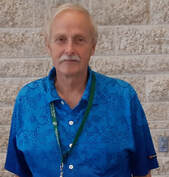 Guy Chambers was born in Edmonton and lives out at North Cooking Lake. He has two books published called Flying Kites in the Moonlight and The Theater. Chambers has been published in many Canadian literary magazines in addition to the USA, New Zealand, and Australia. He also has online publishings that has reached global viewing. Somewhere Else The Birds Are Singing He managed to open the shutters a little way but the gap was smaller than he expected. He eased his head and shoulders inside. The rest of him, his arse and legs, remained outside covered in a blanket then, as dawn broke, covered once more by a blanket of early spring snow. He was hungry. He was always hungry. Somewhere the birds are singing he thought somewhere else the birds are singing. Blighted Once, in Ireland one million died and we’re still counting. One million fled for their lives and we’re still counting. Equivalent to the population of Gaza before starvation ruled the land. Starvation ruled the land in Ireland when the potato crop was blighted. Without potatoes there was no food. Without potatoes there was no money for food. Without money for rent colonial landlords evicted, slave labour of starving men women and children followed the rule through occupation and colonisation. And no help came. No Aid came to help them. And still potatoes were exported. And still the landlords did well. All the colonialists did well. They always do. So Ireland knows how it feels in the depth of its turf, in the depth of its being, its rock, its stones, its bones it knows the story and that change will come with survival first one step at a time and sometimes words and money can effect change as readily as weapons, that time the past shows is the time to make a stand against political manoeuvring against another respected decision un-welcomed again by the most powerful. History shows the time to make a stand. For Ireland knows how lives are blighted. First published in New Verse News, January 2024 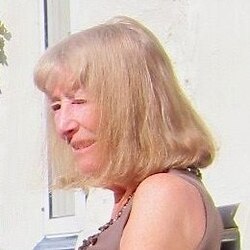 Lynn White lives in north Wales. Her work is influenced by issues of social justice and events, places and people she has known or imagined. She is especially interested in exploring the boundaries of dream, fantasy and reality. She has been nominated for a Pushcart Prize, Best of the Net and a Rhysling Award. www.lynnwhitepoetry.blogspot.com and www.facebook.com/Lynn-White-Poetry War and Hunger You fight a war To be a so-called winner. But, can you free yourself From the clutches of demon hunger? Against the backdrop of Destruction and rubble. The ever-crying hungry eyes Become silent and feeble. War spares no one Affecting everyone Dwellers of the slum Or the owner of a mansion. When natural disasters pay a visit Can you measure its limit? Why create hunger on our own, then In the name of just war, when we're to blame Flexing muscles to show Superiority that's so obscene! Stop this thoughtless act and Fight hunger together for our own good. Make the earth green and hunger-free And ensure every stomach gets food. ***** 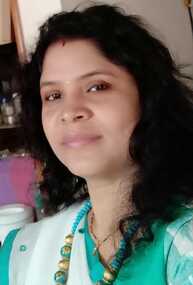 Minati Pradhan writes poems, short stories and essays in English and Odia languages. Her interest areas include nature, gender equality, women’s empowerment, education, social justice and spirituality. Her poetic insights are thought-provoking and compel the readers to take a new perspective. Two of her books- collections of poems, have been published. She has co-authoured two books of essays and one of stories and six of poems and co-edited one book of essays. Her poems, short stories and essays have been published in many magazines and newspapers. She has presented her essays, research papers and poems in various seminars and workshops. She is also a certified counsellor who specializes in guiding the parents of differently-abled children. From The Bottom Of My Stomach Each growl is a reminder of the state That the economy is in lately The rent and bills suck up most of the budget Leaving very little change for food As I sit on my couch imagining a bowl of ramen with bok choy I shudder at the prospect of going hungry another day As my hands shake from a lack of fuel On TV, those with privilege lecture us to cut back Yet gorge themselves on overpriced wine and beef I’m sure that my stomach can survive on virtue signalling Hunger solved, amen to the rich and elite, As I search my couch for loose change Praying that I have three dollars To rid me of this stomach pain. Bio: K.G. Munro is a poet and author who has been published in hundreds of journals across eight different countries. She is currently writing a novel and is about to release a poetry book.
Irish Famine Poems I Surmise So far back I can only surmise, of the family who ate their subsistence meal in the parlour on Sundays. I surmise they were not the poorest. Their house – not a sod, scraw and thatch cabin on a roadside margin. I surmise secure tenure of land. They did not, at least not all, leave. I surmise they were people with self-value, respectability, tenacity. I know that they survived. They were my people on the distaff side. In a Fourth Class Dwelling Report by Robert E. Matheson, Registrar General for Ireland. 1841-1901 Housing of the People of Ireland Part 83. 4th Class – Houses built of mud or perishable materials. One room with one, or no window. 3rd Class – A better description of house. From one to four rooms and windows. 2nd Class – A good farmhouse of five to nine rooms and windows. 1st Class – All other houses of a better description than the preceding. 1841. 4 th class houses comprised 37% of the total. 1851. 4 th class houses comprised 13% of the total. The drop was due to ‘failure of the potato crop leading to famine, fever and pestilence’. With sod, scraw and thatch they made the shelter which enveloped them. The cabin rose from the ground around it. When nothing was left but a flicker of life, the family drew together inside, closing the door for decency. Rain, wind and time melted the walls. The roof lowered. The door rotted. The cabin sank to a hummock, to a wide ridge, disappeared from sight. As had the dead from hunger within, of whom all knowledge has gone. BIO:
I come from Co.Limerick, Ireland. I grew up on a farm there. I am a painter, weaver and have written and published poems in recent years. HUNGER Hunger: Running naked, to the bakery shop On the roadside, at the intersection, Mom’s food is a distant dream, And the money in the pocket is valueless. Hunger: Just not limited to Beggars queued in front of the temple, On near the traffic signal It’s in the eyes of the child Staring from the mother's shoulder cloth bag. Hunger: Was crossing road when the signal turned green- Through the eyes of a corporate mother, She had left home in the morning A child's emotional cry And in the solace of the baby-sitter. Hunger: It also reaches abroad In the educated son's suitcase This shop to that restaurant Back like an empty pocket- Grossly disappointed! Hunger: Laughs out loud, Earth trembles, showing her big belly Money, wealth, all these are worthless Filling a hungry stomach Is truly the glory of greatness. Hunger: Exists everywhere Hidden, yet can be felt Like the presence of an invisible enemy. When hunger strikes There’s no religion or race No wrong or right Hunger teaches man What humanity is! This poem was originally written by me in Odia (Oriya) and titled “BHOKA” and published in an online newspaper. HUNGER DURING COVID-19 Hunger came, Unnoticed, sneaking covertly. Bigger than The virus scare Spreading its wings. Injuring many lives, Puncturing every segment of the livelihood Preying on tender lives more often Took away all the new possibilities along. As they say, "Difficulty comes with kith and kin." True to the proverb, Came along cyclones and locusts. Hunger is often accompanied by Blasé towards the hungry and deprived By the so-called elite mindset. Whom neither the picture of the dead dog eater Nor the dustbin digger, deterred. Will a new day come? When every heart will ache For hunger attack Every eye will open to the injustice Every hand will reach out to the needy. A hungerless new world will be smiling. This poem is awaiting publication in an anthology titled “Unlocking Hopes”.  Minati Pradhan writes poems, short stories and essays in English and Odia languages. Her interest areas include nature, gender equality, women’s empowerment, education, social justice and spirituality. Her poetic insights are thought-provoking and compel the readers to take a new perspective. Two of her books- collections of poems, have been published. She has co-authoured two books of essays and one each of stories and poems. Her poems, short stories and essays have been published in many magazines and newspapers. She has presented her essays, research papers and poems in various seminars and workshops. She is also a certified counsellor who specialises in guiding the parents of differently-abled children. The Beggar A sharp wind makes me pull down my hat, tighten my coat. "Bloody freezing, innit." He has no gloves. His blue swollen fingers barely close around the cup which rattles in response to the few coins I let drop. "Thanks, mate." He huddles a little deeper into the recess by the bank’s cash machine. "They should move them on. Bring the neighbourhood down." I turn. The owner of the complaint is tall, blonde, sheep-skinned, with tell-tale signs of trying to stem the tide of aging. I suddenly feel guilty by association. Because I gave him so little? Because I gave at all? Because I smiled at her? We Didn’t Know We Were Poor Sometimes we went hungry, but not much. Mother made dandelion salad and stingy- nettle soup. Potatoes and carrots in water with salt. Mother had been on the train again to visit farmer Ruttenberger. Left our last silver flatware with his wife. Brought back a big sack of rye. Can see her still, her too large dress, her apron, the coffee machine between her thighs, milling. Everyone was the same. You don’t notice if you have nothing to compare yourself to. My scary aunt with the deep voice and a wart on her chin would send us into the woods: ‘Don’t you go eating the blueberries now. Bring them home, you hear? I need them for jam making.’ There was a place near the brook, where the world smelled of woodruff and ceps, where bluebells announced our indelicate approach. Getting back empty-handed, round-eyed and honest-to-god we hadn’t found even one, my aunt wiped blue-purple stains from our guilty faces while winking at my mother. My uncle is looking for his cat with a darkening face. ‘I’ll find out who ate her!’ When I was Six I remember the smell of earth after summer rain, the high grass hiding me. It tickled, pinched and stung. I followed the activities of beetles, caterpillars and assorted small life. Rolled myself packages of sorrel; chewing them despite the acid was the challenge. Being hungry helped. The lark slowly climbed into blue. Became a small black dot, trilling ecstatically. My summer vision was framed by green stalks of long grasses and their seeds. Standing on a milestone I saw the fields covered in shimmering heat, warping invisible air. Cornflowers and poppies between sandy-yellow wheat. There would be a good harvest. Yes, even then I knew about harvests, watched the sweating man and their flails. Sometimes I’d take home a pocket-full of grains. Mother wiped my face, hands, knees. My feet permanently calloused. The grains ground in the coffee mill held firm between mother’s legs. That last summer before next May when strange men came in planes, tanks, and jeeps, I watched André riding the brown back, his face lit by the evening sun, watched the oxen pulling carts, watched the plow grooving black furrows for the autumn field, watched the swarms of mosquitoes dance over the stagnant pond and fell in love. 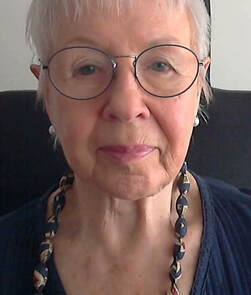 Rose Mary Boehm is a German-born British national living and writing in Lima, Peru, and author of two novels as well as seven poetry collections. Her poetry has been published widely in mostly US poetry reviews (online and print). She was twice nominated for a ‘Pushcart’, once for ‘Best of Net’. www.rose-mary-boehm-poet.com POT BELLY Hope of an empty tomorrow sounds many roars through the weak walls of an ailing belly suffering from malnourished protrusion of that abandoned boy absorbing the jabs of starvation — walking barefooted in the deep valley of hunger while his lower jaw hangs low, yet uncertainty beckons nearer by the hour of the clock. Ragged in his coat of many worries as he carries his funeral on his head, searching ultimately for where to dig a hole in the earth and hide his shame from the eyes of the day's light. For darkness hurls him along the track of misery with song sung in his mother tongue — perturbed by the dialect of strings of a heartbeat unable to hold the tension — of a frustrated voice. Jumping over the fire he leaped above the pot belly bridging the gap between groans of not having and wishing for having bread from the baked loaves of food poisoning. Thirsty & weary: he tried drawing water from the dried well of tears — brimmed over with agony, yet he draws… emptiness instead: bucket full of nothingness, he counts 24 of his bare rib cage. Labeling each as he feels the breath of hunger on his shoulder -- the stench of political corruption fouling his state of being -- violating his human rights and seizing his smuggled pot of beans he made away with when the Watcher wasn't watching. BIO
Uchechukwu Onyedikam is a Nigerian creative artist based in Lagos, Nigeria. His poems have appeared in Amsterdam Quarterly, Brittle Paper, Poetic Africa, Hood Communists and in print anthologies. Christina Chin and he have co-published Pouring Light on the Hills (2022); and forthcoming release: CLOUDS OF PINK. Twitter: @MysticPoet_ |
AuthorsYou can find poets' names under Categories Archives
April 2024
Poets
All
|
||||||||
 RSS Feed
RSS Feed